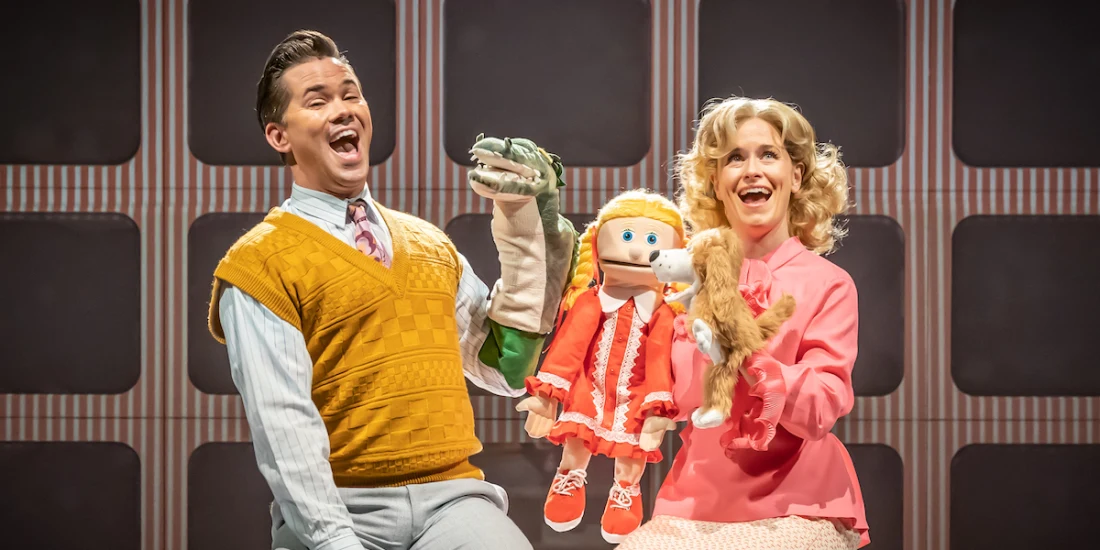'Tammy Faye' review – Elton John's divine new musical is camp, colourful and compassionate
Well hallelujah: the long-awaited Elton John-scored new musical Tammy Faye, about the 1980s American televangelist, is a heavenly pleasure. John’s toe-tapping, soul and gospel-tinged tunes and mighty pop-rock ballads (with pithy lyrics by Scissor Sisters’ Jake Shears) are well matched by a typically spry script from our modern history chronicler, James Graham. And they have created a phenomenal female lead role – in which the spectacular Katie Brayben makes you ardently believe in a higher power.
Tammy and preacher husband Jim Bakker, who are touring small venues with a Christian sock puppet show, rise to fame when they’re given a religious satellite channel – evangelical leaders hope television can be used to replenish their dwindling flock. Actually, it’s when Tammy presents alone (Jim is nervous and cheesy) that a star is born. She speaks honestly, from the heart, and she physically reaches out to all those lonely, disconnected people watching her – and they reach back. It’s the opposite of a judgemental church: it’s welcoming. It’s home.
In order to “put the ‘fun’ into Christian fundamentalism”, the Bakkers then essentially create a cosy morning show, with cooking segments, fashion and soft-serve interviews, and their network PTL (Praise the Lord) becomes a national sensation – much to fury of hard-line religious and socially conservative figures like Jerry Falwell, who thinks the Bakkers are undignified. Presidential candidate Ronald Reagan even stops by, hoping for an endorsement.
It’s chilling to see Reagan and Falwell eventually strike a deal – church and state becoming inseparable – and Falwell’s corrupt cabal also furthering their agenda via the Supreme Court. The modern parallels are evident: evangelicals backed Trump on the understanding that he too put conservative judges in place, leading to the repeal of Roe v Wade, and potentially more attacks on LGBTQ+ rights to come.
Graham’s rich, well-researched script (with definite shades of his most recent play Best of Enemies, now in the West End) emphasises the dark side of this weaponising of television, too – although the show as a whole takes great pains to place Tammy on the right side of history. Her version of Christianity is about love, not hate, and she even interviews (and embraces) a gay pastor with AIDS live on air. That extraordinary exchange really happened, and it’s an electrifying scene.
Tammy’s support for the gay community also gives Rupert Goold’s production licence to be gloriously, ecstatically camp. The wall of TV screens in Bunny Christie’s design light up like a cross, or switch to a rainbow disco; Lynne Page’s period routines are knowingly kitsch (one features a penis pump); Neil Austin’s lighting is a riot of pink, blue and orange; Katrina Lindsay supplies marvellous frocks with pussy-bow ties; and Suzanne Scotcher’s wigs for Tammy, including a ginormous bubble perm, are almost another character.
There are also religious re-enactments at the theme park, Heritage USA, which Jim Bakker sets up – all featuring total drama-queen actors. The flogging of Christ becomes weirdly homoerotic. It’s hugely entertaining, but also underlines a serious point about the peculiar contradictions in the evangelical movement: they love flamboyant show business, and figures like Tammy are really camp icons, yet there’s also virulent homophobia. The greatest censure here is reserved for such sheer hypocrisy.
However, the show suffers from what we might term The Evita Problem. Though it is eventually critical of the Bakkers, as it’s revealed that they took millions from ordinary people to fuel their extravagant lifestyle, they remain sympathetic figures. Even Jim sexually assaulting a female fan is framed as the desperate act of a closeted gay man. Tammy is even more protected: the script suggests she was completely unaware of the extent of Jim’s fraud. She becomes a straightforward heroine – a compassionate feminist survivor battling the evil patriarchy.
Though John's score lacks breakout earworms, it supports the narrative superbly. He gives Tammy big girl-power anthems, which the incredible Brayben delivers with barnstorming conviction, blowing the roof off the Almeida. Her character journey is a vocal one too, from sweet crooning to rock-star defiance, and she captures the natural charisma and candour that made Tammy an early TV star. That admiring approach is a morally murky choice from the creative team, but Brayben gives a knockout performance.
American actor Andrew Rannells is perfectly cast as the endearingly hapless Jim, and, among a vivid and versatile ensemble, Amy Booth-Steel is excellent as Tammy’s increasingly critical friend Jan. But the standout supporting turn comes from Zubin Varla as antagonist Falwell, tormented by a spiritual crisis as he grapples with whether he should sell his soul to television if it means saving the soul of America.
The show is rather overcrowded (even if detours like the Pope holding a secret crisis summit are delightfully bonkers); a tighter focus could create a more complex, and challenging, portrait of the Bakkers. But it’s thrilling to see the birth of a new original musical of this quality: it restores your faith in the power, and in the sheer entertaining fun, of the medium. Praise Tammy Faye!
Tammy Faye is at the Almeida Theatre to 3 December.
Photo credit: Andrew Rannells and Katie Brayben in Tammy Faye at the Almeida Theatre (Photo by Marc Brenner)
Originally published on
